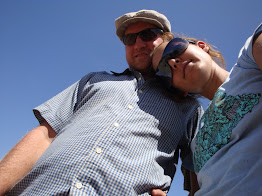And I now present to you, Mr. and Mrs. Schuette – just in Olkiramatian though. We had a joint Maasai wedding with Sam and Johann at the Resource Centre. The centre symbolized our new home and Sam and I left early in the morning to our Maasai parent’s boma to get dressed and prepared for the wedding. We were led to separate huts, adorned with Maasai beads – some to keep and some for ceremonial purposes - and then sat waiting for our husbands to arrive. Kichwa mkubwa (big head) – my Maasai family stressed over mine and tried two different head ornaments, which neither of them really fit. After awhile everyone else arrived and Paul and Joel came into my boma - Joel was our best man. Then my father and mother gave us advice and two older men that filled the role of godparents, gave blessings. The beer came out for the wazee (old men) and we were told that beer always accompanied blessings. My father’s advice was to be good to Paul because the family has chosen him for me so we should try to work together. My mother’s advice was the same, but she stated it more bluntly and said that because they would be receiving livestock from Paul they didn’t want him to come back and say that their daughter was lazy. No real livestock was exchanged though a bull and 2 goats were slaughtered for the ceremony. Another two goats were born on the day of the wedding and given to Sam and I as wedding presents. I’m not sure who will take care of them in our honor - perhaps I’ll arrive back in Bozeman with my first goat to start the farm. When all blessings were given, Paul and I were led out of my parent’s boma and started the journey to my new home. Fresh cow dung, milk, and a special type of grass were placed over the entrance of my parent’s boma for good luck. When we arrived back at camp there were about 300 people waiting for us and the women sang and danced us into the boma. We were led to each of our tents, which represented our new homes, and there we sat and enjoyed sodas while we were given more blessings. My Maasai name was given official status at this stage – Nashipai. It means joy and happiness in Maasai. The christening required some chanting and my tweezing out the pauses and filling them in with a response. I think I did okay though clapping and laughing always trailed my voice.
We decided to make the most efficient use of our time with Dave and Erika in the field by first having our wedding on day 1 and introducing them to pretty much everyone in the community and on day 2 tracking one of the lions and seeing a hunt and a kill. Kereng’ende and Esipata, along with 4 of their pride mates, killed a warthog and we had front row seats to their supper. A black-back jackal and a few hyenas appeared in the background with leftovers in mind though one warthog didn’t even split between 6 lions very politely. Day 4 we collared lion number 6 – Bolt. She has a lighting bolt white patch under her left eye and she happened to be the lion we had in mind when we went out looking. Within an hour, there she was sitting on the side of the road. She’s part of a third pride of lions further south into the Shompole conservancy. A pride we’ve known about for some time, but haven’t had the chance to monitor closely. They are extremely used to vehicles due to the Shompole lodge sitting prominently in their home range. There are 4 young one-year old males without manes yet that walked right up to the truck, curious and fearless. So the first night out - we see a kill and the first attempt to collar - a success. Day 5 and 6 we spent telling stories and reliving hardships.
The goodbyes begin and our long lost friend Mkubwa (the big man) came to bid us farewell. Well, to be honest we meet him 98% of the way. Dr; Western took us on a scouting mission via plane and we heard Mkubwa’s signal about 18 kilometers north of camp. The next day we set out on an expedition into unchartered territory outside of Olkiramatian’s group ranch. Sitting on the edge of where the truck would go and barely hearing the signal, we played the buffalo calf call, which drew Mkubwa out along with another male lion and three lionesses – pride number 4. So there he was - definitely looking mkubwish – and not on his own. It’s hard to say if he abandoned Mwanzo for them or if he had abandoned them for a brief stint with Mwanzo during the drought. Either way Ren has reaped the benefits of his absence, but by looking at Mkubwa now, I can’t imagine that he ever lost a fight. Content with our findings we started driving back, pole pole (slowly) over scattered lava rock. The lions seemed a bit concerned that there wasn’t actually a buffalo calf around and they trailed our exit just to make sure. It took us awhile to get there, navigating the lava rock and huge gullies so it’s possible the lioness’s had never seen a non-editable moving beast and wanted to be absolutely sure that this was true.




















.jpg)
